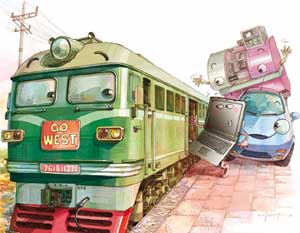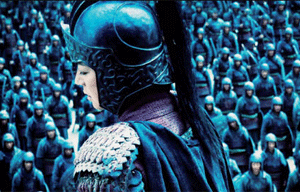Rossini provides some light relief for operagoers
Updated: 2011-10-24 10:28
By Raymond Zhou (China Daily)
|
|||||||||
 |
|
Men play the crucial female roles in this version of Cinderella. |
Beijing is about to be swept away by two of the Austrian composer Mahler's symphony cycles, one at the Beijing International Music Festival and the other at the National Center for the Performing Arts (NCPA). Amidst all the brooding and lamentation, two Rossini comic operas should provide light relief.
This might be termed perfect counterpoint from the point of view of music programming. Normally, Rossini's comedies have popular appeal, but they are not frequently seen in China. NCPA, the prime venue for opera productions, is quickly gaining recognition for its outstanding Puccini and Verdi, but this is its first outing with the bel canto master Rossini.
And what an auspicious debut! As in La Cenerentola (Cinderella), she descends at the royal ball, fireworks fly - both visual and vocal. The stunning coloratura singing, typical of Rossini's work, is a reminder of what the human voice is capable of, and by extension, the elevating stature NCPA is gaining as an opera house. When Cinderella delivers her pyrotechnic aria that pushes the night to a crescendo, her singing stunts win over the most reserved audience members - if her spirit of love and forgiveness has not already done so.
Cinderella has a few surprises for those familiar with the regular version. Devoid of mythical elements, there is no transformation of pumpkins and mice into chariots. More interestingly, especially for feminists, two crucial female roles are given to men - the evil stepmother is here a step-father, and the fairy godmother is replaced by Alidoro, a tutor and romantic adviser to the prince. The foot fetishism of the slippers is also gone, substituted by the less dramatic prop of a bracelet.
However, director Petrika Ionesco more than makes up for the loss of familiar elements - with a set that seems to reflect the mind of a mad scientist with an aristocratic upbringing. Video projections work well, especially in Act II in the storm scene. Louis Dsir designed the costumes, conveying the broad comedic strokes of the opera. The Beijing Modern Dance Company, however, does not add much with its balletic movements.
A bel canto opera lives or dies on grand singing. In the imported cast, Spanish mezzo-soprano Silvia Tro Santaf has a regal quality in her voice capable of the most difficult techniques. Paolo Bordogna, in the role of the valet Dandini, almost steals the show with his comic chops. Tenor Maxim Mironov has an agile voice and looks like a prince, which is rare for opera princes.
The Chinese cast is equally excellent, with Wang Hongyao in the lead. Wang will also play Rosina in the upcoming Barber of Seville. Liao Changyong, arguably China's best lyrical baritone, will sing the title role of Figaro.
This could be the beginning of a mini-boom of bel canto operas in China. Given the Chinese physique, it is easier to sing the gymnastic-like coloratura genre than the heavy Wagner opus. And audiences may also find it easier to take to the fun-filled shows of Rossini and Donizetti. So, let the vocal firecrackers sparkle over the Middle Kingdom.
La Cenerentola finishes its first run on Oct 23. The Barber of Seville runs on Nov 24-27. If you are into tragedies, NCPA offers a revival of Puccini's La Boheme on Oct 28-30 and the instantly acclaimed Tosca on Dec 21-24.











